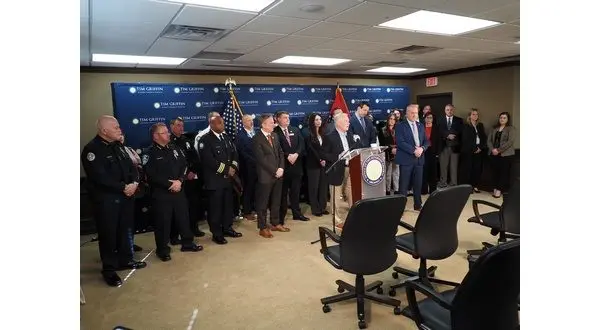
New laws addressing human trafficking that Arkansas legislators approved this spring become effective next week.
Sen. Joshua Bryant, R-Rogers, who sponsored six of the laws approved during the 2025 legislative session, told a committee in March that Arkansas has historically received poor rankings for state laws addressing child sex trafficking.
“So while these six laws are not all encompassing, they are a good start in the direction to try to address our gaps within our laws,” Bryant said.
Gov. Sarah Huckabee Sanders identified human trafficking as a priority for her administration when she issued an executive order shortly after taking office in 2023 that called on the Department of Human Services to “develop an integrated approach to address human trafficking, to support the victims, and to prosecute the criminals to the fullest extent of the law.”
A working group that formed as a result of the order issued a list of recommendations that included “implementing an evidence-based screening tool to identify human trafficking victims; updating training and educational materials; and revising data, information sharing, and state protocols to better serve victims,” according to a press release.
According to a law firm’s analysis of confirmed victims of human trafficking from 2019-2023, Arkansas had the 15th highest rate in the country. The analysis identified 780 total victims during this time period for a rate of 25.43 per 100,000 people.
At the start of the legislative session in January, Senate President Pro Tempore Bart Hester identified human trafficking as a legislative focus for some senators.
“Leaders like Sens. Josh Bryant and Missy Irvin will push Arkansas to be a national leader in protecting victims of human trafficking, while sending a stiff message to the traffickers that we’re going to find you and we’re going to deliver the harshest penalties in the country.”
Irvin, a Mountain View Republican, told a legislative committee in April that her legislation, which became Act 1003, would provide legal protections for children “compelled to commit crimes as a direct result of being trafficked, including protections for victims who commit acts of violence against their rapists and traffickers.”
Meanwhile, Bryant successfully sponsored the following six laws, which become effective Aug. 5:
Act 663 revises laws regarding promoting prostitution to have stricter classifications and penalties, and creates the offense of promoting prostitution at a business.
Act 664 provides a statute of limitations period of 10 years for a victim of human trafficking.
Act 665 requires the court to issue a no-contact order if a defendant is charged with an offense under the Human Trafficking Act of 2013, and expands the sealing of criminal records of human trafficking victims.
Act 666 requires mandatory restitution be awarded to human trafficking victims, and amends the Arkansas Crime Victims Reparations Act to allow claims to be filed within five years instead of one or within five years of turning 18 if the victim is a minor.
Act 667 expands law enforcement’s power to seize and forfeit assets used in human trafficking, creates the offense of harboring an endangered runaway minor, establishes a Human Trafficking Operations Unit within the Arkansas State Police and creates the Arkansas Human Trafficking Council Support Fund.
Act 987 removes the statute of limitations for specific human trafficking-related offenses and prohibits the possession, manufacture, transportation or distribution of child sex dolls.
Members of the Arkansas House of Representatives also approved laws related to human trafficking that go into effect on Aug. 5, including Act 484, which requires the display of information about the National Human Trafficking Hotline in a nail salon or massage business licensed by the Arkansas Department of Health.
Since its inception in 2007, the Human Trafficking Hotline has identified 770 cases of human trafficking in Arkansas and 1,929 victims associated with those cases.
Rep. Joey Carr, an Armorel Republican who sponsored the legislation, testified in February that Arkansas State Police had identified nail salons and massage businesses as “new hot spots” for human trafficking.
Arkansas Attorney General Tim Griffin announced in January the arrest of suspected human trafficking perpetrators at 12 “illicit massage parlors” across the state. Seventeen purported trafficking victims between the ages of 29 and 65 were identified.
Act 682, another bill that goes into effect next week, creates the unlawful use of a communication device during the commission of a human trafficking offense. Each use of a communication device is a separate offense, and violating the law is a Class C felony. Rep. Kendon Underwood, R-Cave Springs, was the lead sponsor and Bryant was a co-sponsor.
Elm Springs Republican Rep. Robin Lundstrum sponsored Act 366, which creates an enhanced penalty for recruiting trafficked people from certain places, such as a shelter that serves runaway youth, a foster home or correctional facility. Because the law had an emergency clause, it went into effect when the governor signed it into law in March.
WebReadyTM Powered by WireReady® NSI










